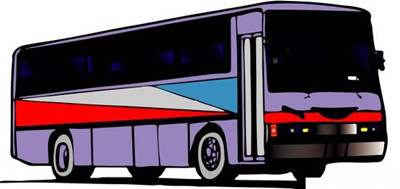公共汽車
Up to speed
提升速度
Copying the capital is even harder than it looks
模仿首都易,實(shí)則苦難言
FEW Britons feel passionate about buses. Unlike the railways, they spur few protests or angry letters in local newspapers. On August 26th IPPR, a left-leaning think-tank influential in Labour circles, attempted to change this. Buses “seem to be the forgotten aspect of public transport”, the authors of a new report sighed. But their proposed prescription is almost as doddery as an old Routemaster.
少有不列顛人對(duì)公共汽車表示憤怒的。不像鐵路,他們很少在當(dāng)?shù)貓?bào)紙上對(duì)公共汽車提出抗議或者向報(bào)社投寄發(fā)泄怒氣的信件。在8月26日,公共政策研究所—一個(gè)在工黨圈內(nèi)有影響力的左傾智庫(kù)——試圖改變這種狀況。在一則新報(bào)道中,有作者嘆道公共汽車“看來(lái)已經(jīng)成了公共交通系統(tǒng)中被遺忘的一環(huán)”。不過(guò)他們提出的建議基本上跟老司路者一樣老掉牙了。
In London, bus use is soaring. Some 7m journeys are made there each day, on a bus network that is highly regulated by Transport for London (TfL), a body that oversees public transport in the city, as well as many roads. But outside the capital the deregulated bus network can be patchy, with multiple ticketing systems and buses prone to get stuck in traffic, and use is falling.
在倫敦,對(duì)公共汽車的使用飆升。每天約有7百萬(wàn)人次到此觀光,故而公共汽車系統(tǒng)為倫敦運(yùn)輸局(TfL)高效管理,這個(gè)組織管轄倫敦城內(nèi)公共運(yùn)輸系統(tǒng)以及相當(dāng)多的道路。不過(guò)在首都之外的公交網(wǎng)絡(luò),由于缺乏管理變得差強(qiáng)人意,相應(yīng)的大量的售票系統(tǒng)和公共汽車在交通中發(fā)生擁堵,因而對(duì)公共汽車的使用量下降。

The sharp contrast between London and the rest suggests to IPPR that large transport bodies similar to TfL ought to be set up, particularly in big metropolises. This would allow both better co-ordination and more effective lobbying of the Treasury. Since TfL was created in 2000 London’s bus network has been pumped with cash. Although it has fallen back slightly, net public support to London’s buses, at 809m in 2012-13, is still far higher than the amount doled out to other big cities.
倫敦及其他地區(qū)的強(qiáng)烈對(duì)比使得IPPR認(rèn)為類似于 TfL 的大型交通組織應(yīng)當(dāng)建立起來(lái),特別是在大都市。這有利于更好地協(xié)調(diào)合作以及更為有效地游說(shuō)財(cái)政部以獲得資金支持。自從2000年以來(lái)TfL 建立,倫敦的公交網(wǎng)絡(luò)來(lái)錢如井噴,雖然現(xiàn)在有些許回落,但公共交通網(wǎng)絡(luò)在2012~2013年間給倫敦公交共資助了八千九百萬(wàn)英鎊,遠(yuǎn)高于給予其他大城市的資金撥款。
The bigger-body plan, though, is likely to remain a theory. Even in Manchester, the most go-ahead big city outside London, a combined authority representing local governments is only just getting limited powers over transport. London is exceedingly unusual and hard to copy. It has a high-profile elected mayor, a large congestion-charging zone and a young, fast-growing population that shuns cars. Bus use is rising even though they are no longer particularly cheap. Fares are now, by one measure, some of the highest in Britain. Since 2005 they have increased by 23%, only slightly less than in other metropolitan areas.
不過(guò)這種擴(kuò)大組織的計(jì)劃,很可能會(huì)停留在紙面上。即便像曼徹斯特這種除倫敦之外走在前列的城市,當(dāng)?shù)芈?lián)合執(zhí)政的政府對(duì)于交通運(yùn)輸業(yè)的管轄權(quán)力依然有限。倫敦過(guò)于特殊,難以復(fù)制。它有高調(diào)選舉產(chǎn)生的市長(zhǎng),一大片擁堵收費(fèi)的區(qū)域以及一群迅速成長(zhǎng)起來(lái)的年輕、買不起車的人。盡管公共交通出行已經(jīng)不是特別便宜了,但是對(duì)公共交通系統(tǒng)使用數(shù)量仍在上升。據(jù)一項(xiàng)調(diào)查表明,如今的公共汽車出行費(fèi)用,有些在不列顛都是最高的。公交費(fèi)用自2005年以來(lái)已經(jīng)增長(zhǎng)了23%,僅次于其他大城市地區(qū)。
Buses are doing well in a few other spots, too. As the report notes, they are popular in Oxford and Brighton, congested cities with high parking fees. In East Kent 29m passenger trips were made on buses run by Stagecoach, Britain’s biggest bus operator, in 2011, up from 14m in 2003. Punctuality is improving in many areas. Routes have been cut back outside London—but many of them were publicly subsidised ones squeezed by austerity.
如報(bào)道中提到的,在牛津和布萊頓這些停車費(fèi)用很高的擁擠的城市里,公共交通也十分流行。在東肯特,出行使用“驛站馬車”公司公交車的人次由2003年的140萬(wàn)上升至2011年的290萬(wàn)。該公司乃是不列顛最大的公交運(yùn)營(yíng)商。在諸多區(qū)域不準(zhǔn)時(shí)的狀況正在改善。倫敦之外的線路已經(jīng)砍掉不少—不過(guò)很多是由于財(cái)政緊縮政策而被排除出局的。
Rather than try and replicate TfL, local authorities might be encouraged to impose stricter parking regulations and work harder with bus companies to improve service. Concessionary fares, overseen by individual councils, could be simplified and targeted at the poor far more efficiently. But in some areas it would be wise to accept that bus use will just continue to decline, says David Leeder, a bus expert. In regions such as north-east England, where unemployment is the highest in the country, car ownership has traditionally been low. But it is starting to catch up as the economy recovers. That is more bad news for buses.
與其嘗試復(fù)制TfL模式,不如鼓勵(lì)地方當(dāng)局制定更為嚴(yán)格的停車條例并與公交公司共同致力改善服務(wù)。由個(gè)別理事會(huì)監(jiān)督下的優(yōu)惠收費(fèi)項(xiàng)目可以簡(jiǎn)化,并有效地向窮困人員傾斜。公交研究專家戴維德·李德說(shuō),不過(guò)在一些區(qū)域,接受公交車使用量減少也許是明智的。在諸如英格蘭東北部的一些區(qū)域,那里是整個(gè)國(guó)家失業(yè)率最高的地方,私車擁有量從來(lái)很低。而當(dāng)經(jīng)濟(jì)復(fù)蘇的時(shí)候,私車擁有量也開(kāi)始上揚(yáng)。這對(duì)于公交車事業(yè)來(lái)說(shuō)無(wú)異于雪上加霜。












